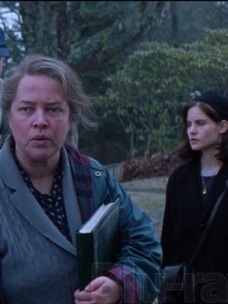Sunday, March 26, 1995
DOLORES CLAIBORNE. Written by Tony Gilroy. Based on the 1992 novel by Stephen King. Music by Danny Elfman. Directed by Taylor Hackford. Running time: 131 minutes. Rated Mature with the B.C. Classifier’s warning "some very coarse language, occasional suggestive scenes and violence."
DOLORES CLAIBORNE (KATHY BATES) has a little motherly advice for her adult daughter Selena (Jennifer Jason Leigh): "Sometimes, being a bitch is all a woman has to hold onto."
OK. As gender philosophy goes, it doesn't have quite the ring of "a man does what a man's gotta do."
It lacks, well, poetry.
Then, again, no one ever accused writing machine Stephen King of being deep. He just churns it out, one best-selling novel after another, a paperback hitmaker who could just be the most popular scary storyteller since the invention of ink.
In Dolores Claiborne, King introduced his readers to a Maine mom accused of murder. As adapted for the screen by Tony (The Cutting Edge) Gilroy, it is a story of generational reconciliation with Dolores's estranged daughter returning home to isolated Little Tall Island.
The state's case appears open and shut. Dolores, 55, employed as a housekeeper and live-in companion by Vera Donovan (Judy Parfitt), was found standing over the wealthy widow's body with a marble rolling pin in her hand.
Twenty years earlier, state police detective John Mackey (Christopher Plummer) investigated the "accidental" death of Dolores's husband Joe (David Strathairn). Although she was cleared of all responsibility, Mackey remains convinced that she was and is a killer.
King's take on Stella Dallas, Dolores Claiborne covers all the feminist shock-thriller bases. Included in his tale of sinister sisterhood are repressed memory syndrome, alcoholism, infidelity, drug dependency, casual misogyny, telephone terrorism and physical abuse.
In a flashback to 1975, we learn that the widow Donovan is the original source of the "be a bitch" quote. "It's a depressingly masculine world we live in," she tells hard-working Dolores.
Fortunately for "unhappy women," accidents do happen. Husbands "die and leave their wives their money."
Feminist sympathies notwithstanding, this is the stuff of potboiler melodrama. To his credit, director Taylor (An Officer and a Gentleman) Hackford works hard to inject a little cinematic razzle-dazzle into what is essentially a homicidal chick flick.
To demonstrate his seriousness, cinematographer Gabriel (Caravaggio) Beristain drains all the present-time sequences of their colour to reflect the hard blue winter of Dolores's discontent. By contrast, past times are evoked with vivid home-movie hues.
The actresses all play it with the intensity of Royal Shakespeareans. Leigh (and Ellen Muth as the 13-year-old Selena) puts across the ambiguous, haunted feelings burning within her.
Bates, who won herself an Oscar playing a King nutcake in Rob Reiner's Misery, turns the title character into a Yankee-accented Mother Courage. Like so many fine American film performers, she downloads megawatts of talent into a comic-book role.
But, then, sometimes being a bitch is all the work that's going.
The above is a restored version of a Province review by Michael Walsh originally published in 1995. For additional information on this archived material, please visit my FAQ.
Afterword: My personal encounter with Stephen King was, if memory serves, during 1984’s Westercon science-fiction convention in Portland. The program included a panel discussion on the current state of sci-fi cinema. Participants included screenwriter Bonnie MacBird (best known for the 1982 computer-game feature Tron), novelist King, whose works were the subject of screen adaptations, and me, a newspaper film critic. We got along, and the result was a congenial conversation and good will all around.
Today, of course, King is a pop culture colossus. Since Carrie made her movie debut in 1976, his novels and short stories have been the basis for some 47 feature films and more than 30 television shows. I have to admit to enjoying parochial pride in the number of them that were filmed on location in Canada. The tally includes 13 theatrical features, including director David Cronenberg’s 1983 adaptation of The Dead Zone, made in Niagara-on-the-Lake, Ontario, and Fraser Heston’s 1993 Needful Things, shot in West Vancouver, B.C.
Dolores Claiborne (1995), subject of the above review, took the party to Lunenburg, Nova Scotia. In the years since, Vancouver has been seen in Dreamcatcher (2003), Riding the Bullet (2004) and 1922 (2017). Toronto provided production services for the 2003 Carrie remake, It (2017), It Chapter Two (2019) and In the Tall Grass (2019). Quebec communities were seen in 2004’s Secret Window and the 2019 Pet Sematary remake. Saskatchewan roads are the supporting players in Dolan’s Cadillac (2009).
Television, as it turns out, is an even bigger player, with more than a third of all King adaptations to date shot north of the border. The 1990 It mini-series was based in Vancouver, as were the 2002 Carrie made-for-TV remake, a six-season (2002-2007) The Dead Zone series and the 2020 The Stand mini-series. Winnipeg pavement was seen in the 1997 TV feature Trucks (1997), while Southern Ontario was the backdrop of 2016’s eight-episode 11:22:63 mini-series.
In recent years, Nova Scotia has dominated as King country. Haven, the five-season (2010-2015) series based on The Colorado Kid made its home in Peggy’s Cove. The 2011 mini-series Bag of Bones, the 2014 TV movie Big Driver (2014) and single-season series The Mist (2017) and Chapelwaite (2021) all were Halifax-based productions.
J.J. today: The six feature reviews now posted to Reeling Back include director Uli Edel’s 1989 adaptation of Last Exit to Brooklyn, George Armitage’s crime drama Miami Blues (1990), Michael Bortman’s troubled-family drama Crooked Hearts (1991), Barbet Schroeder’s psychological thriller Single White Female (1992), Alan Rudolph’s biographical drama Mrs. Parker and the Vicious Circle (1994) and Taylor Hackford’s Stephen King adaptation, Dolores Claiborne (1995).
See also: Jennifer Jason Leigh titles previously available in the archive include director Amy Heckerling’s 1982 ensemble piece Fast Times at Ridgemont High, Ron Howard’s Chicago firefighting adventure Backdraft (1991) and the Coen brothers’ Capraesque The Hudsucker Proxy (1994).
